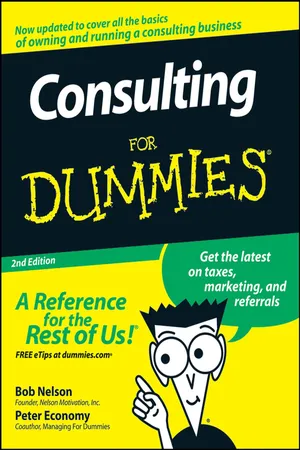
eBook - ePub
Consulting For Dummies
Bob Nelson, Peter Economy
This is a test
Compartir libro
- English
- ePUB (apto para móviles)
- Disponible en iOS y Android
eBook - ePub
Consulting For Dummies
Bob Nelson, Peter Economy
Detalles del libro
Vista previa del libro
Índice
Citas
Información del libro
A clear, concise resource for entering this lucrative career field Consulting For Dummies, 2nd Edition includes a reorganization and narrower focus of the topic, with new or updated information that delves into the specifics of running your own consulting business. There is greater emphasis on the business of consulting, along with financial and legal issues involved in setting up a consulting business, deepening coverage of consulting proposals, and entirely new chapters on higher-level consulting issues that more-established consultants are demanding.
Preguntas frecuentes
¿Cómo cancelo mi suscripción?
¿Cómo descargo los libros?
Por el momento, todos nuestros libros ePub adaptables a dispositivos móviles se pueden descargar a través de la aplicación. La mayor parte de nuestros PDF también se puede descargar y ya estamos trabajando para que el resto también sea descargable. Obtén más información aquí.
¿En qué se diferencian los planes de precios?
Ambos planes te permiten acceder por completo a la biblioteca y a todas las funciones de Perlego. Las únicas diferencias son el precio y el período de suscripción: con el plan anual ahorrarás en torno a un 30 % en comparación con 12 meses de un plan mensual.
¿Qué es Perlego?
Somos un servicio de suscripción de libros de texto en línea que te permite acceder a toda una biblioteca en línea por menos de lo que cuesta un libro al mes. Con más de un millón de libros sobre más de 1000 categorías, ¡tenemos todo lo que necesitas! Obtén más información aquí.
¿Perlego ofrece la función de texto a voz?
Busca el símbolo de lectura en voz alta en tu próximo libro para ver si puedes escucharlo. La herramienta de lectura en voz alta lee el texto en voz alta por ti, resaltando el texto a medida que se lee. Puedes pausarla, acelerarla y ralentizarla. Obtén más información aquí.
¿Es Consulting For Dummies un PDF/ePUB en línea?
Sí, puedes acceder a Consulting For Dummies de Bob Nelson, Peter Economy en formato PDF o ePUB, así como a otros libros populares de Betriebswirtschaft y Beratung. Tenemos más de un millón de libros disponibles en nuestro catálogo para que explores.
Información
Part I
So You Want to Be a Consultant
In this part . . .

Although the term consultant can mean different things to different people, if you’ve decided to become one, then you need to decide exactly what it means to you. In this part, we take a 50,000-foot overview of the topic, and then dig in a bit deeper by exploring whether or not consulting is right for you. We show you how to assess your own skills and preferences, and how to prepare to make the move to consulting. Finally, we consider exactly what you need to do to take the plunge into starting your own consulting business — as painlessly (and profitably) as possible.
Chapter 1
Introducing the Wonderful World of Consulting
In This Chapter



Consulting has taken the world of business by storm, and it seems today that there is a consultant to do most anything you could ever want done. A consultant can be a partner in a large management consulting firm or a freelance writer. A consultant can be a self-employed Web site designer or a part-time cosmetics salesperson. A consultant can be an architect who works out of his or her home, an expert witness hired to testify at the latest Trial of the Century, or a virtual stock trader who provides investment advice to clients around the globe over the Internet.
In this book, we use the term consultant quite loosely. We define a consultant as someone who sells his or her unique expertise to someone else. This expertise can be anything from showing someone how to properly lay out, plant, and fertilize an organic vegetable garden, to analyzing and recommending changes to a complex aerospace manufacturing operation.
So, while many people think of consultants only in terms of the narrow field of professional management consulting — firms such as KPMG, Bain & Co., PricewaterhouseCoopers, and others that specialize in fixing “broken” organizations — the world of consulting is much bigger than that. Anytime someone pays you for your unique expertise or advice — whether it’s creating a snazzy Web page for a friend’s business, measuring the stress that a Category 4 hurricane might exert on a new home, or suggesting where to dig a new water well on a ranch in Wyoming — you are acting as a consultant.
In this chapter, we consider the many reasons why energized and talented people like you are becoming consultants, and then we briefly cover the topics of starting up your own consulting firm, understanding the consulting process, selling your services, and taking your business to the next level, all of which are covered in more detail later in the book. Finally, we invite you to take our nifty Consulting Challenge Quiz, which helps you determine whether you have what it takes to become a successful consultant.
The Reasons for Consulting: Money, Yes . . . But What Else?
Men and women from all walks of life with all manner of experience and expectations have reasons for becoming consultants. Some are leveraging their knowledge to help their clients, while others enjoy the variety of assignments that consulting can bring. Some prefer working for large, diversified consulting firms — with offices scattered all across the globe — while others are simply tired of working for someone else and ready to start their own consulting firms in a spare bedroom of their house. Still others are just looking for a way to make some extra money.
Whatever your reason for becoming a consultant, businesses of all sorts — and individuals and organizations — are using consultants more than ever. According to market research published in 2007 by consulting experts Kennedy Information, both consulting revenues and profits are up in the United States across the board, and are projected to continue to grow well into the future. One key reason for this is that skilled consultants can be brought into an organization on short notice, fix a problem, and then move on to another organization in need. No need to hire someone, pay them a salary, and provide them with benefits and a retirement plan.
And although some think that money is the main reason people choose to become consultants, that’s not really what it’s all about. Sure, a lot of people make good money as consultants — make no mistake about it. But to many people, the benefits of being a consultant go far beyond the size of their bank accounts. This section talks about some of the most compelling nonmonetary reasons people enter the consulting field.
Leveraging your talent
Everyone is especially knowledgeable about at least one thing. You may, for example, have worked for 20 years as a construction loan specialist for a large bank. When it comes to construction loans, saying that you are an expert is probably an understatement. And because of the huge network of contacts that you have developed over the years, many other organizations could benefit from your unique experience.
Or you may enjoy exploring the Internet in your spare time. You’ve built many Web pages for yourself and your friends, and you always keep up with the latest in authoring tools and other developments. Although you work at a grocery store as a cashier ten hours a day, five days a week, you always manage to find time to pursue your favorite hobby. Would it surprise you to find out that many businesses would hire you and pay you good money to build and maintain Web pages for them? It shouldn’t — that’s what consultants do.
Being tired of working for someone else
Most people have dreams of what they want to do with their lives. Some dream of buying their own home. Others dream of establishing a career or family. Still others dream of winning the lottery and moving to Bora Bora. However, in our experience, one of the most common dreams — the one that everyone who works in an organization dreams at least once or twice a day — is the dream of being your own boss.
It’s not that all bosses are bad. Both of us have had many great bosses over the years, and we hope that we have been good bosses to those who have worked for us. Most people, however, are born with a strong desire to be independent and to make their own decisions rather than to have others make their decisions for them. And when, as time goes on, you begin to know more about what you do than your supervisors or managers, working for someone else can become especially difficult.
Getting laid off or fearing you will be
-plgo-compressed.webp)